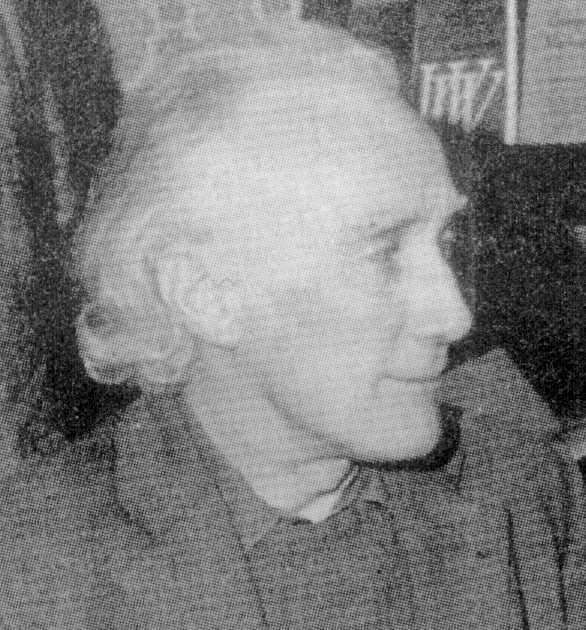
NEWS: this version of the site is now defunct. For the new version (faster download, no ads), point your browser at http://www.jacobite.org.uk/maccaig/.
Norman MacCaig was born in Edinburgh, on 14 November 1910. His father was a Lowlander and his mother from the island of Scalpay, and this meeting of Highland and Lowland cultures runs through the rest of his life. He was educated at the Royal High School and went on to study classics at the University of Edinburgh. For most of his career, he worked as a primary school teacher, until in 1967 he was appointed Fellow in Creative Writing at Edinburgh. Three years later, he became a reader in poetry, first at the University of Stirling and then again at Edinburgh. For almost all of his life, MacCaig divided his time between Edinburgh and Assynt in the north-west Highlands: the landscape of the latter in particular is a recurring theme of his poetry. The complementary, rather than contrasting, backgrounds of mountains and city are one of the "contradictions" which he relished. He died in Edinburgh, on 23 January 1996.
 |
| Norman MacCaig – from the Scotsman newspaper |
His first collection of poetry, Far Cry, was published in 1943 (at a time when his career was broken by the Second World War, although as a pacifist he did not take part in combat). Both it and The Inward Eye (1946) belonged to the New Apocalypse movement: never a man for movements and -isms, MacCaig later disowned both of these, claiming that he wanted to destroy all copies of them – although two copies were discovered among his papers after his death. The first collection in which MacCaig's individual voice is audible was Riding Lights (1955): this was followed by The Sinai Sort (1957), A Common Grace (1960), A Round of Applause (1962), Measures (1965), Surroundings (1966), Rings on a Tree (1968), A Man in My Position (1969), The White Bird (1973), The World's Room (1974), Tree of Strings (1977), The Equal Skies (1980), A World of Difference (1983) and Voice Over (1988). The final editions of his Selected Poems and Collected Poems also include a selection from around 600 poems which were found after his death and previously unpublished.
MacCaig's place in twentieth-century Scottish poetry is undoubted. At one end of the scale, he was a friend and sparring partner of both Hugh MacDiarmid, the reinventor of Scots verse, and Sorley MacLean, the poet responsible more than anyone else for the revival of Gaelic, as well as other major poets of the period, such as Robert Garioch and Sidney Goodsir Smith. He acted as mentor to the next generation of Scottish writers, such as Liz Lochhead and Robert Crawford, and more importantly than either, is consistently one of the most popular poets among people meeting Scottish literature for the first time at school and college.
Perhaps as a consequence of this success at the popular level, MacCaig's poetry has become part of the vocabulary of Scottish political and social discussion, as the nation comes to terms with its own identity. This isn't true merely in the contexts of issues like land ownership and access to the hills, but in wider spheres – in a lecture to the Royal Society of Edinburgh in 1999, for example, businessman Ewan Brown started by quoting MacCaig on nationalism: "When I hear someone say I'm a Scot and proud of it, I can't help wondering why? Why should you be proud of a country just because, as a result of a million accidents, you were born in it?... I love its landscapes, and detest its philistinism. I like its weather and loathe its parochialism. Historically, I admire the battle it fought for freedom while strongly suspecting the motives of most of the self seeking thugs who led that battle. I respect the Scot's independence of mind and can't stand his submissiveness to the wrong authorities. And so on."
For all the accessibility of his most popular poems, MacCaig's writing was never simple to categorize. Sorley MacLean famously described his development as a "long haul to lucidity"; and the poetry of the earlier collections certainly tends to be more formal in structure, and denser in syntax (there is a story that MacLean, presented with some specimens of MacCaig's early work, responded "Yes, Norman: but when are you publishing the answers?"). Surroundings (1966) is the first volume where he allows himself the luxury of free verse, and it's at this stage that he wrote poems like Assisi, with its deceptively direct approach. The main themes, though, recur throughout his writing career: landscapes and the natural world; the limitations of language and knowledge; the need to see beyond sentimentality and balance the dark and the light sides of life. For all that he was a "happy man", he was too far-seeing to retreat into a cocoon: "America, Italy, Canada, I rested on you / briefly as a butterfly, and returned / to suck the honey of Assynt / and want no more, though that honey / has three bitternesses in it, three deaths / more foreign to me / than the other side of space".
The biographies of Scottish writers linked to above are to be found (among others) on the Slàinte (Scottish Libraries Across the Internet) website, while the English Department at the University of St Andrew's provides a brief guide to Scottish history and literature here.
On this site, further discussion of MacCaig's writing is included on the Comments and More criticism pages.